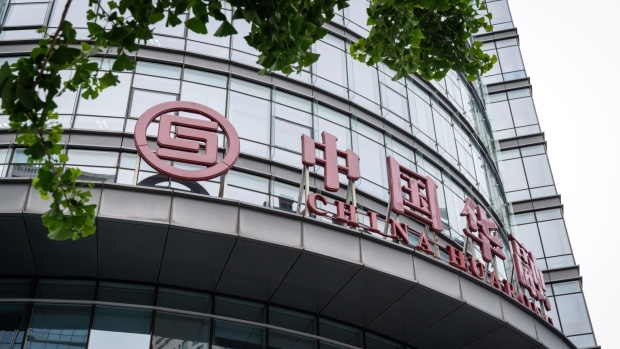Aug 16, 2022
China’s Huarong Expects $2.8 Billion in First-Half Net Loss
, Bloomberg News

(Bloomberg) -- China Huarong Asset Management Co.’s shares and bonds plunged after the bad-debt manager said it expected a net loss of 18.88 billion yuan ($2.78 billion) in the first half of the year as credit impairments surged.
The predicted loss compares with a profit of 158 million yuan the Beijing-based firm reported in the six months through June 30 last year. Credit impairment losses “increased significantly” in the current period while the firm also booked “significant” realized losses on some equity investments due to market volatility, it said in a filing Tuesday without elaborating.
Shares of Huarong tumbled as much as 16% in Hong Kong early Wednesday, heading for the lowest close since March. Its 3.375% bond due 2030 fell 1.1 cents to 74.2 cents, set for the biggest decrease in about six weeks, according to Bloomberg-compiled data.
The group said the interim results didn’t meet expectations “because of the impact of volatility in the capital market and downturn in the real estate market, which were caused by various factors such as the recurrence of the Covid-19 pandemic, geopolitical conflicts and pressure in macroeconomy.”
China’s distressed-debt managers, among the major lenders to developers, have been in turmoil amid a deepening property debt crisis and a slowing economy.
Smaller rival China Great Wall Asset Management Co. missed a second deadline at the end of June to publish its 2021 annual report, while China Cinda Asset Management warned in July that net income may drop between 30% to 35% in the first half, renewing investor concerns about the health of the $730 billion industry.
Created following the Asian financial crisis in the late 1990s to safeguard China’s state-owned banks, Huarong and its peers expanded into everything from insurance and leasing to brokerage and trust through cheap borrowing from onshore and offshore markets, and turned into major shadow lenders themselves.
Huarong has been selling non-core assets including its banking and securities arms this year as part of a sweeping overhaul that also involved a $6.6 billion government bailout and a change of ownership. The firm posted a net income of 370 million yuan last year after revealing a massive loss for 2020.
In a separate filling Tuesday, the firm said it plans to transfer a 76.8% stake in Huarong Trust to China Trust Protection Fund for 6.15 billion yuan. Taken together with the sale of four other financial units including Huarong Securities Co., the bad-debt manager expects to receive 30.5 billion yuan, according to another company statement.
Huarong said it would make “every effort” to reduce risk and ease the pressure on real estate-related projects. It added that for the second half of this year, “the long-term positive fundamentals of China’s economy have remained unchanged and macro policies will play a more active role in expanding demand,” according to the filing.
(Updates with market reaction in the third paragraph.)
©2022 Bloomberg L.P.






